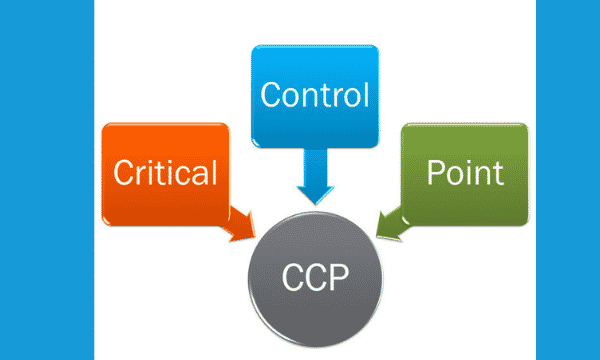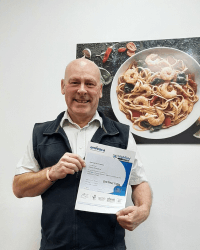What Is A Critical Control Point
Identifying critical control points is a key element of a HACCP plan. In order to answer the question “What is a Critical Control Point?” it is important to have a clear understanding of other important HACCP steps and principles.
Hazard AnalysisHazard Analysis
Identifying hazards is the first principle of HACCP and an essential component of determining critical control points. It involves identifying what could go wrong in the production process that might result in the food becoming unsafe. For example, a hazard in production might appear if a food is not cooked to the right temperature as this allows bacterial survival, which could cause food poisoning.

What is a Control Measure?
A control measure is an action we take in the production of food which helps us eliminate a hazard or reduce it to a safe level. For example, the action of keeping ready-to-eat food in the refrigerator at 5c or below which reduces the multiplication of pathogenic bacteria.
What is a Critical Control Point?
A critical control point is a step in the production where taking control measures is essential. Without this step, the food we produce would be unsafe. CCPs tend to be cooking, and hot or cold storage of food, as losing control of temperature (for example by keeping hot food below 63C for longer than 2 hours) would mean that the food would be unsafe for the consumer. CCPs are identified through the expertise and judgement of those responsible for the HACCP plan.

Master The Art Of Food Safety - Unlock Your Potential Today!
Are you passionate about food safety and committed to delivering excellence? Our Food Safety Courses are designed for individuals like you who refuse to compromise on safety. Take the leap towards becoming a certified expert. Click on the link below and unlock a world of possibilities!
How to Keep a Critical Control Point at a Safe Level?
Further steps and principles in the HACCP plan require that we identify critical limits. These tend to be values such as time, temperature or size which are unambiguous and can be measured. Once the critical limits have been decided a plan needs to be made for how they are going to be measured. For example, if the CCP is microorganisms surviving in chicken when it’s cooked, the critical limit would be the temperature that we must reach (75c for 30 seconds) and the measuring would be the equipment we use, a probe thermometer. Corrective measures would need to be planned, such as cooking the chicken for longer if the temperature has not been reached.

HACCP Training and Implementation
HACCP development and implementation require specific knowledge and expertise. UK legislation requires that those responsible for the development and implementation of the system have received adequate HACCP training.
If you have a question or enquiry about food safety, please call the team on 01452 502113 or complete our enquiry form.
Find this helpful?
Signup to our email notifications to receive alerts when we publish new blogs. We promise not to spam your inbox, you will just get a short snappy intro to Health and Safety articles we think you will love.
"*" indicates required fields

Guide to Choosing the Perfect Training Provider
If you’ve got a question or query, please contact our super friendly team, they will be delighted to help you!
Simply get in touch via phone or email.

Free
Resources &
Downloads
Informative. Useful. Practical.
Here at Envesca we believe that we are good at giving proactive, sensible and useful advice. Below you will find some free resources that you can download on a host of subjects that will help you and your business.
Training Available
Envesca offer a number of different training courses, which offer advice and guidance on these topics.




